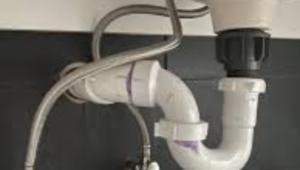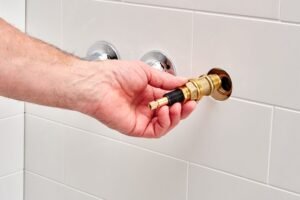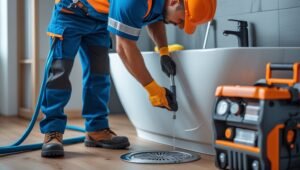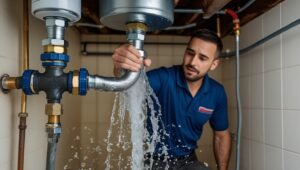At Forever West Plumbing, Tankless water heaters offer an efficient solution for homeowners looking to save on energy bills and enjoy a continuous hot water supply. Unlike traditional water heaters, which reheat stored water in a tank, tankless models heat water on demand, offering nearly unlimited hot water while using energy more efficiently. Although tankless heaters may have a higher initial cost, their long-term efficiency makes them a smart investment for many households.
In this guide, we’ll walk through the essentials of choosing a tankless water heater, including types, costs, installation tips, maintenance advice, and top brands to consider.
What is a Tankless Water Heater?
A tankless water heater, also known as an on-demand or instantaneous water heater, heats water as it flows through the system rather than storing it. By eliminating standby heat loss associated with conventional tank heaters, tankless models provide energy savings and a continuous hot water supply.
How It Works: When you turn on a hot water tap, cold water flows into the tankless unit, where it’s instantly heated by either a gas burner or electric coil. This system heats water only when needed, making it energy-efficient and reliable.
Pros and Cons of Tankless Water Heaters
Pros:
- Energy Efficiency: Tankless heaters can be up to 34% more efficient than traditional tanks, saving money on energy bills.
- Space Saving: Compact and wall-mounted, tankless models save valuable floor space.
- Longer Lifespan: With proper maintenance, tankless heaters can last over 20 years.
Cons:
- Higher Initial Cost: The upfront cost for tankless heaters, especially gas-powered ones, is typically higher than tank heaters.
- Installation Complexity: Installation may require electrical or gas upgrades and venting, adding to the overall cost.
Types and Tankless Water Heater Price
There are several tankless water heater options to fit various home needs:
Gas-Powered Tankless Heaters
- Cost: $1,000 – $1,500
- Pros: Heats water quickly and is ideal for larger homes or high-demand households.
- Cons: Requires venting and may incur higher installation costs.
Electric Tankless Heaters
- Cost: $500 – $1,500
- Pros: Lower installation costs, no need for venting, and a compact design.
- Cons: Limited output, which may not meet high-demand requirements in larger homes.
Indoor vs. Outdoor Heaters
- Indoor Models: Protected from the elements, indoor models require proper venting if gas-powered.
- Outdoor Models: Designed for milder climates, outdoor heaters vent naturally but need weatherproofing for durability.
Condensing vs. Non-Condensing Heaters
- Condensing Heaters: Capture and reuse exhaust heat, making them highly efficient with reduced venting needs.
- Non-Condensing Heaters: Often more affordable initially but require stainless steel venting, which can add to installation costs.
Costs and Tankless Water Heater Installation
Upfront Cost: Tankless water heaters generally cost more than conventional tank heaters, ranging between $500 and $1,500 depending on the type and model.
Installation Costs: Due to the complexity of installing a tankless unit, professional installation is often required, costing between $2,500 and $4,500. Variables like system complexity and the need for venting affect these costs, so consulting a professional for an accurate estimate is essential.
Top Tankless Water Heaters for 2024
For those considering propane or natural gas tankless water heaters, here are some top-rated models based on efficiency, durability, and customer satisfaction:
Noritz EZ111 EZ Series
- Best For: Large families or high water demand
- Max GPM: Excellent for multi-bathroom homes
- Customer Rating: Highly satisfied users
Rheem Performance Platinum 9.5 GPM
- Best For: Medium to large homes
- Efficiency: High energy efficiency and heating capacity
- Value: Excellent overall value
Rinnai RU199iP RU Series
- Best For: Compact spaces with high hot water demand
- Max GPM: Ideal for homes with multiple bathrooms
- Rating: Highly rated by homeowners
Rinnai V53DeP V Series
- Best For: Apartments or smaller homes
- Efficiency: Budget-friendly with solid performance
- Customer Value: Good value for smaller households
- Rinnai RL75eP RL Series
- Best For: Outdoor installations
- Durability: Weather-resistant and self-ventilating
- Reliability: Known for long-term efficiency
What to Consider Before Buying
When selecting a tankless water heater, it’s important to consider these key factors:
Size Requirements: Ensure your heater’s gallons per minute (GPM) output matches your household’s hot water needs. For example, a 2-3 GPM model may suffice for a single person or couple, while larger families may need 6-9 GPM.
Fuel Type: Choose between gas-powered and electric models based on your home’s infrastructure. Gas models generally have higher output, while electric models offer more placement flexibility.
Maintenance Needs: Tankless water heaters benefit from annual maintenance, particularly in areas with hard water. Routine professional checks (typically $45-$130) help extend the unit’s lifespan and maintain efficiency.
Installation Tips
Given the complexities involved, hiring a licensed professional for tankless water heater installation is recommended. Here’s a brief look at the process:
- Preparation: Shut off the power, gas, and water supply to the unit.
- Water Line Installation: Use durable, heat-resistant piping for hot and cold water connections.
- Pressure Relief Valve: Install a valve to safely discharge excess pressure.
- Ventilation (if gas-powered): Ensure proper venting to avoid dangerous gas buildup, following manufacturer guidance.
- Final Setup: Test the heater by purging air from the system and checking for proper function.
Maintenance Essentials
- Annual Professional Inspection: Yearly checks can prevent issues with gas pressure, venting, and overall performance.
- Regular Cleaning: Clean in-line filters to prevent debris buildup, especially if you have hard water.
- Flushing and Descaling: Annual descaling helps remove mineral buildup and maintains efficiency.
- Monitor Venting: For gas models, ensure vents are clear of obstructions to prevent hazardous gas buildup.
Benefits of Going Tankless
- Energy Savings: Tankless heaters heat water only when needed, reducing standby energy loss and lowering energy bills.
- Lower Monthly Costs: While tankless units cost more upfront, they often lead to monthly energy savings that can offset initial expenses over time.
- Space Efficiency: Wall-mounted models free up floor space and allow for flexible installation options.
DIY vs. Professional Installation
Professional installation is recommended for tankless water heaters due to complex requirements. A certified installer will ensure proper venting, adherence to codes, and optimal sizing for efficient operation. Many municipalities require professional installation for compliance and safety.
Top Tankless Water Heater Brands
When considering a tankless water heater, here are some leading brands known for quality, efficiency, and durability:
- Rinnai
- Rheem
- Stiebel Eltron
- Eco-Smart
- Bosch
These brands are highly rated and trusted by homeowners for their consistent performance and energy savings.
FAQs
1. Are tankless water heaters energy-efficient?
Yes, tankless models are up to 34% more energy-efficient than traditional water heaters, resulting in energy and cost savings.
2. Can a tankless water heater meet the needs of a large family?
Yes, with the right GPM output, tankless models can meet the demands of larger households. High GPM models or multiple units may be necessary for multi-bathroom homes.
3. How much maintenance does a tankless water heater require?
Annual maintenance is recommended, especially in areas with hard water, to keep the unit running efficiently and extend its lifespan.
4. Can tankless water heaters be installed outdoors?
Yes, many models are designed for outdoor use, ideal for mild climates. Outdoor models vent naturally and don’t require complex venting systems.
Are you looking for Tankless water heaters repair and Installation Services? Click here to get services from Forever West Plumbing professional team.







One Response